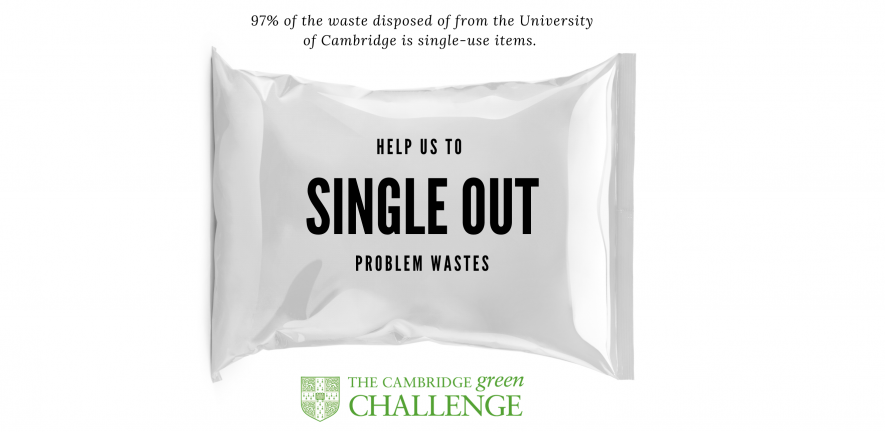
Submitted by Peter Lumb on Thu, 2020-12-17 14:10
2021 is upon us, bringing not just a new year but new opportunities for making a positive sustainability difference! The Sustainability Team and others around the University will be working on many environmental issues over the coming months. To help target sustainability efforts, we’ve hand-picked three key topics which we’ll be encouraging staff and students to take on in earnest in 2021. The first of these campaigns, which will run throughout Lent term, is something which many of us are keen to address: single-use disposables.
The ‘Single Out’ campaign
We’ve known for many years that the 'make, use, dispose’ way of life is having a big impact on our environment. Our use of single-use items not only fills up landfills, chokes our rivers and seas, but also contributes to dwindling natural resources.
Having said this, there are many great examples from around the University of Cambridge of staff and students taking action to take on single-use wastes which are having a real impact, like the ones highlighted below.
Cutting out single-use items – examples from around the University
Read more examples and case studies on reducing waste, and get tips on how you can do the same on our waste guidance pages. |
Recent audits of the University of Cambridge’s waste show how big the issue of single-use disposable waste is, but this also reinforces just how big of a change we could make if we can better understand the issue of single-use disposables, and find solutions that help to reduce, replace, reuse or recycle the most problematic items.
How can you help?
While waste audits have given us some understanding of the single-use wastes the University generates, as shown below, this snapshot also demonstrated that there are large variations in the types and amounts of waste generated around the University. Gaining a better understanding of single-use waste from all corners of the University will help us to really narrow down our efforts on those items which add the most to our waste.
That's why we need your help with the first phase of the Single Out campaign, the Single Out Survey.
Get involved - take the ‘Single Out’ SurveyUpdate to this article: the Single Out Survey is now closed, the results are available here.Click this link or use the QR code pictured below to visit the SIngle Out survey. How to fill out the survey:Step 1: Think about the waste you generate in the course of a day or week at work, or get together with a few colleagues to brainstorm the single-use items you use in your department – ideally involve colleagues from a few different areas (e.g. lab researchers, academics, office staff, catering and events staff, or staff involved in cleaning, maintenance, stores and deliveries). We don’t expect a comprehensive account of all items you use, but we’re hoping to gain an insight into the most common types, and amounts, of single-use disposable items used across the University. Step 2: Visit the survey and fill it out for up to 20 items. It’s OK to answer the survey using estimated figures, however it’s better if you can back up your responses with sources of data such as:
You can collect data covering any period of time, whether it be a day, week, month or longer but when entering your figures in the survey, please factor your figures so that they show equivalent use over a year. If you think your use of single-use items is currently curtailed by lockdown, ideally try to obtain figures which give an average use accounting for both pre-lockdown usage and current usage. Step 3: Click submit! We’d like responses as soon as possible in the new year, but will keep the survey open until 12 February. Contact sustainability@admin.cam.ac.uk if you have any queries or require guidance on filling out the form. |
What happens next?
We hope to gather lots of information about the single-use wastes that are generated around the University. Once survey results are in we’ll be crunching the numbers to identify the most common items to 'Single Out’! We’ll then be holding a series of workshops, grouping interested individuals and departments to brainstorm solutions and strategies for reducing, replacing, reusing and recycling each waste stream. Be sure to stay tuned for more updates in Greenlines, or you can follow our Yammer page for up-to-the-minute updates on progress and quick answers to your questions on the ‘Single Out’ campaign!
| Update to this article: See the results of the survey and read about the next steps! |
Written by Peter Lumb
